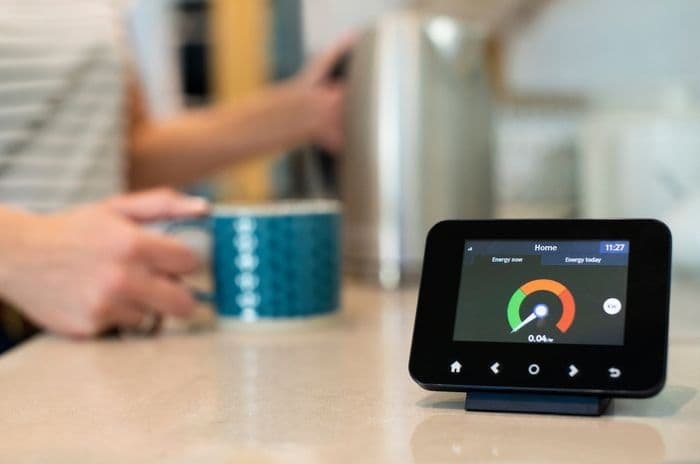Home > Energy > News > Doubts about roll-out of smart meters by 2020
Doubts about roll-out of smart meters by 2020
Concerns are building about the roll-out of smart meters to UK homes and businesses amidst installation delays and the possibility of security breaches.

The Department for Business, Energy and Industrial Strategy says that the Government is "committed to ensuring that every home and small business in the country is offered a smart meter by the end of 2020."
The Smart Metering Programme is an attempt to modernise how customers use and report energy use, with an aim to install at least 50 million gas and electricity meters to domestic premises by the 2020 deadline. These meters allow us to access real-time information on in-home energy usage and send this data direct to energy companies, bringing an end to estimated billing.
But as the latest figures show that just 8.54 million meters have so far been installed domestically since the Programme began in 2011, there's still a long way to go before the target is met.
When we throw into the mix security concerns about the vulnerability of smart meters to cyber attacks, more and more questions are being asked about the Government's plans to modernise our in-home energy monitoring.
Roll out unlikely to be completed before deadline
Smart Energy GB,"the voice of the smart meter roll-out," is independent from the Government and energy suppliers. On its website it squarely claims that "by the end of 2020, around 53 million smart meters will be fitted in over 30 million premises (households and businesses) across Wales, Scotland and England."
And although both the Government and Ofgem want uptake to meet this level, it's ultimately down to households to take the meters on and energy companies to plan and deliver installation by the deadline.
Recent research from Which? has suggested that energy suppliers would have to install 24 smart meters per minute, working 24 hours a day, 365 days a week, in order to come anywhere close to the 50 million target by 2020, and that even then they probably wouldn't be able to achieve it.
There's also the fact that smart meters are no longer compulsory, since the Government downgraded its official policy in 2017 to merely offering one to every household by 2020. So despite the calls from energy companies to sign up for one, there hasn't been as much uptake from the public as expected.
In response to the research, Robert Cheesewright, Director of Policy and Communications at Smart Energy GB, emphasised how important it is that we modernise our energy systems and affirmed that "energy suppliers are working hard to ensure everyone is able to enjoy the transformative experience of smart meters as soon as possible."
Compatibility problems
One of the main stumbling blocks to the smart meter roll-out is the fact that old versions of smart meters, the so-called 'first generation' meters, are incompatible with the new technology that is being developed to create a centralised smart meter infrastructure. This infrastructure is being created and implemented by Data Communications Company (DCC), which is regulated by Ofgem.
Currently, many first-generation smart meters 'go dumb' when a customers moves supplier, meaning that an estimated 866,000 of these meters are currently operating out of their smart mode.
But DCC changes all of this, ensuring that all installed smart meters can talk to all energy suppliers, network operators and service companies, making the market much more open and accessible for switching smart meter customers.
Second-generation smart meters, which will be connected to the DCC infrastructure and therefore universally applicable, will be rolled out later in 2018.
Security concerns
Concerns have also been raised about the inability of smart meters to defend themselves from cyber attacks and data theft.
Indeed, the above-mentioned roll out of second-generation meters was stalled in 2016 by intelligence agency GCHQ because energy companies were planning on using only a single decryption key to secure them all, leaving them incredibly vulnerable to attacks.
A big worry was that hackers could attack using a so-called 'Trojan horse', which would piggy-back off smart meters to access other connected gadgets in the home, like computers and mobile phones, and steal personal details.
In response to these worries, Robert Cheesewright of Smart Energy GB said he was disappointed with the number of media reports about smart meter safety, pointing out that smart meters had been "designed with some of the country's most senior cyber security experts, including the National Cyber Security Centre, a part of the government's own security organisation, GCHQ."
He went on to add that smart meters are not connected to the internet and that "only your energy information is stored on your smart meter and this is encrypted. Your name, address, bank account or other financial details are not stored on the meter."
For interested readers, GCHQ's Dr. Ian Levy has also written extensively in this blog about the security behind the smart metering system, which he hopes "strikes the best balance between security and business needs.".

We are independent of all of the products and services we compare.

We order our comparison tables by price or feature and never by referral revenue.

We donate at least 5% of our profits to charity, and we aim to be climate positive.
Latest News

2 January 2024
Energy prices increase by 5%
23 November 2023
Energy price cap to rise 5% in January 2024
24 October 2023
Energy companies must do more to support customers

